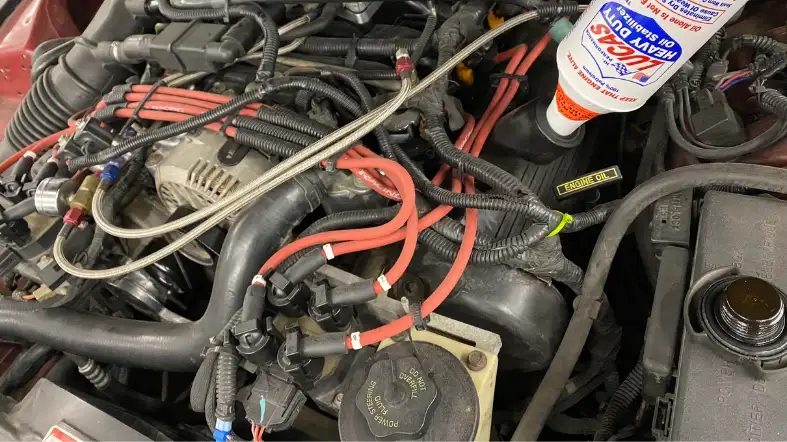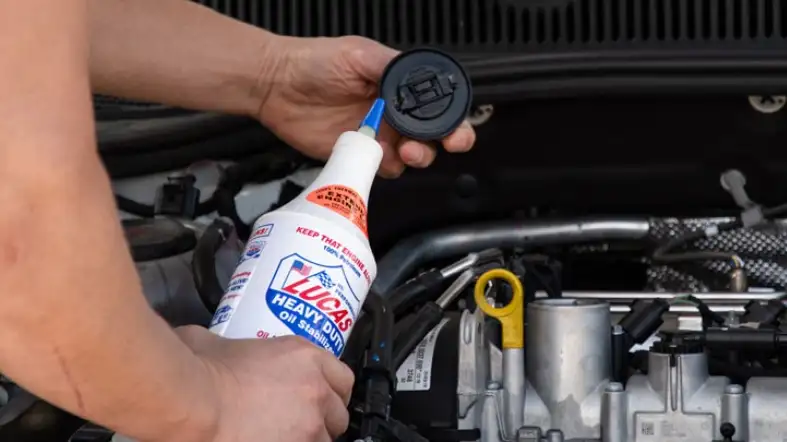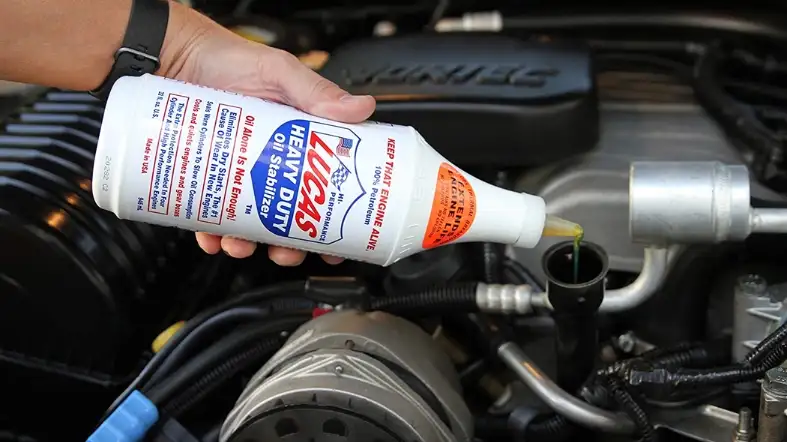Lucas Oil Stabilizer is a popular engine oil additive that claims to reduce friction, improve engine performance, and extend the life of your engine.
With its impressive list of benefits, many car owners wonder if they can use Lucas Oil Stabilizer as a replacement for a quart of engine oil.
Engine oil plays a crucial role in the proper functioning of an engine, and it is essential to understand the impact of using an oil stabilizer as a replacement for engine oil.
In this context, we will explore the function of engine oil, the role of Lucas Oil Stabilizer, and whether it can replace a quart of engine oil.
Can Lucas Oil Stabilizer Replace a Quart of Oil?
Lucas Oil Stabilizer cannot replace a quart of oil entirely. It is an engine oil additive that can improve engine performance, reduce friction, and extend engine life, but it does not have the same functions as engine oil.

It can be mixed with engine oil in the recommended ratio to achieve better results.
Using Lucas Oil Stabilizer in the right proportion with engine oil can help reduce engine wear, improve fuel efficiency, and enhance engine performance, but it should not be used as a complete replacement for engine oil.
Why Lucas Oil Stabilizer cannot be Replaced?
There are several reasons why Lucas Oil Stabilizer cannot replace a quart of oil entirely:
Engine Oil is Essential for Lubrication:
Engine oil is a specially formulated oil designed to lubricate the engine’s moving parts, including pistons, bearings, and cams.
Engine oil reduces friction and wears between metal surfaces that come into contact with each other.
It has a specific viscosity, and additives to ensure that it can lubricate the engine effectively.
Lucas Oil Stabilizer is an additive that can improve the lubrication properties of engine oil, but it is not designed to provide the same level of lubrication as engine oil.
Engine Oil Plays a Role in Cooling:
Engine oil helps to cool the engine by carrying heat away from the combustion chamber.
The oil absorbs heat and then dissipates it through the oil cooler or the engine block.
Engine oil has specific properties that enable it to perform this task effectively, such as high heat capacity and good thermal conductivity.
Lucas Oil Stabilizer is not designed to provide the same cooling properties as engine oil.
Engine Oil Cleans and Protects:
Engine oil contains detergents that help clean the engine by removing deposits and preventing sludge buildup.
These detergents also protect the engine by neutralizing acids and preventing corrosion.
Engine oil also contains additives that improve its viscosity, prevent foaming, and reduce oxidation.
Lucas Oil Stabilizer is not formulated to provide the same cleaning and protection properties as engine oil.
Engine Oil Helps Seal the Engine:
Engine oil helps to seal the engine by preventing leaks and maintaining proper compression.
The oil creates a barrier between the pistons and cylinder walls, ensuring that the engine operates smoothly.
Engine oil also lubricates the valve train and other moving parts, reducing friction and wear.
Lucas Oil Stabilizer is not designed to provide the same sealing properties as engine oil.
Using an Oil Stabilizer can Void Warranty:
Using an oil stabilizer such as Lucas Oil Stabilizer as a replacement for engine oil can void the vehicle’s warranty.
The manufacturer recommends specific engine oil types and viscosity levels to ensure optimal engine performance and longevity.
Deviating from these recommendations can lead to engine damage and void the warranty.
Benefits of Using Lucas Oil Stabilizer

There are several benefits of using Lucas Oil Stabilizer in conjunction with engine oil. These benefits include:
Reduced Friction:
Lucas Oil Stabilizer reduces friction between the engine’s moving parts, which can result in improved fuel efficiency, reduced engine wear, and extended engine life.
Improved Performance:
Lucas Oil Stabilizer can improve engine performance by reducing engine drag, increasing horsepower, and improving throttle response.
Enhanced Protection:
The additive contains anti-wear agents that help protect the engine against wear and tear. It also has high-temperature stabilizers that help to prevent oil breakdown and oxidation.
Better Fuel Economy:
Lucas Oil Stabilizer can improve fuel economy by reducing friction, improving engine efficiency, and reducing engine drag.
Reduced Oil Consumption:
Lucas Oil Stabilizer can help to reduce oil consumption by improving the sealing properties of engine oil, which reduces oil leaks and burn-off.
Quieter Engine Operation:
The additive can help to reduce engine noise by reducing friction between moving parts.
Increased Longevity:
Using Lucas Oil Stabilizer can help to extend the life of your engine by reducing engine wear, protecting against corrosion, and reducing oil breakdown.
Limitations of Using Lucas Oil Stabilizer

While Lucas Oil Stabilizer can provide several benefits, there are also some limitations to using this engine oil additive. These limitations are:
Can Void Warranty:
Using Lucas Oil Stabilizer as a replacement for engine oil can void the vehicle’s warranty.
The manufacturer recommends specific engine oil types and viscosity levels to ensure optimal engine performance and longevity.
Deviating from these recommendations can lead to engine damage and void the warranty.
Not a Replacement for Engine Oil:
Lucas Oil Stabilizer is not a replacement for engine oil. It is designed to be used in conjunction with engine oil to enhance its lubrication properties.
Using Lucas Oil Stabilizer as a replacement for engine oil can result in engine damage and reduced engine performance.
Cost:
Using Lucas Oil Stabilizer can add to the cost of oil changes, as it is an additional additive that must be purchased separately.
It may not be cost-effective for some vehicle owners.
Not Suitable for All Engines:
Lucas Oil Stabilizer may not be suitable for all types of engines, particularly newer engines that require specialized engine oil formulations.
Potential for Overuse:
Overuse of Lucas Oil Stabilizer can result in reduced engine performance and engine damage.
It is essential to follow the manufacturer’s recommendations for the correct amount of additive to use.
Tips for Using Lucas Oil Stabilizer Effectively
To use Lucas Oil Stabilizer effectively and safely, follow these tips:
Manufacturer Recommendations:
Always follow the manufacturer’s recommendations regarding the type and viscosity of engine oil to use.
Lucas Oil Stabilizer is not a replacement for engine oil and should be used in conjunction with it.
Check Compatibility:
Check to see if the Lucas Oil Stabilizer is compatible with your engine type.
While it works well with most gasoline and diesel engines, it may not be suitable for all engines, particularly newer ones that require specialized engine oil formulations.
Use Recommended Amount:
Use the recommended amount of Lucas Oil Stabilizer as per the manufacturer’s instructions. Using too much of the additive can cause engine damage.
Add at Oil Change:
Add Lucas Oil Stabilizer during oil changes to ensure it mixes thoroughly with the engine oil.
Allow Time for Mixing:
Allow the engine oil and the additive to mix properly before starting the engine. This allows the additive to distribute evenly throughout the engine oil.
Regular Maintenance:
Regularly change the engine oil and filter as per the manufacturer’s recommendations.
Lucas Oil Stabilizer is not a substitute for proper engine maintenance.
Monitor Performance:
Monitor the engine’s performance after using Lucas Oil Stabilizer.
If there are any unusual noises or performance issues, seek professional help immediately.
FAQs
How Much Lucas Oil Stabilizer Should Be Used With Engine Oil?
The recommended amount of Lucas Oil Stabilizer to use with engine oil is 20% of the total oil volume in the engine.
For example, if the engine requires five quarts of oil, one quart of Lucas Oil Stabilizer should be added.
Can Using Lucas Oil Stabilizer Void The Vehicle’s Warranty?
Using Lucas Oil Stabilizer as a replacement for engine oil can void the vehicle’s warranty.
Follow the manufacturer’s recommendations for engine oil and additives to ensure optimal engine performance and avoid voiding the warranty.
Is Lucas Oil Stabilizer Suitable For All Types Of Engines?
Lucas Oil Stabilizer may not be suitable for all types of engines, particularly newer ones that require specialized engine oil formulations.
Check the compatibility of the additive with the engine type before use.
Conclusion
Lucas Oil Stabilizer is not a replacement for a quart of engine oil.
It is an additive that is meant to be used in conjunction with engine oil to enhance its lubrication properties and provide several benefits, including reduced friction, improved engine performance, enhanced protection, better fuel economy, reduced oil consumption, quieter engine operation, and increased longevity.
Using Lucas Oil Stabilizer as a replacement for engine oil can result in engine damage and void the vehicle’s warranty.
It is essential to follow the manufacturer’s recommendations and use Lucas Oil Stabilizer responsibly to ensure optimal engine performance and longevity.
